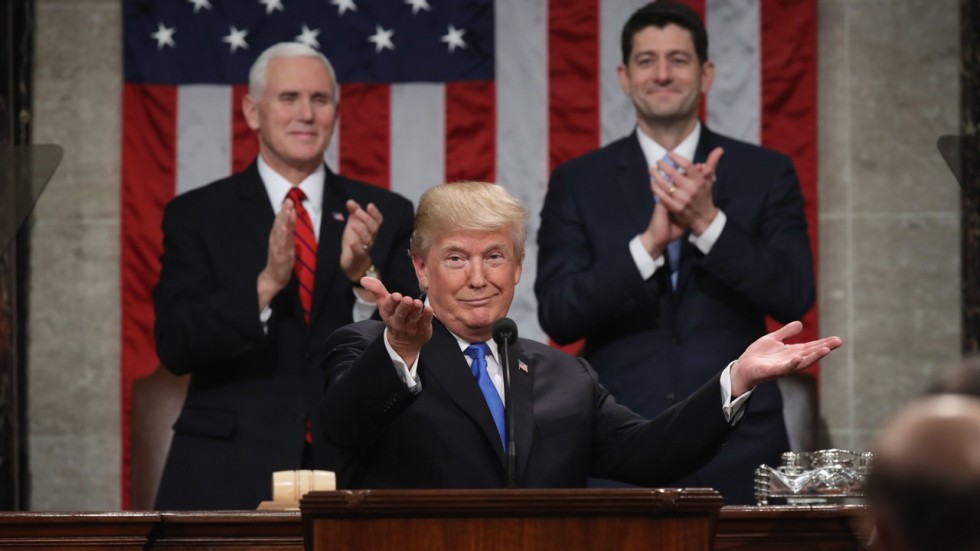
(AFP)
U.S. President Trump delivered his first State of the Union Address on Jan 30.
The targeted audience of the speech would be Congress and the American people. The address contained no surprises, and the manner of Trump’s delivery was more presidential and low-key than before. The address was a one-year review of the Trump administration’s achievements and a plan for its future work.
The address focused on one theme and five major topics. The theme is the combination of “Make America Great Again” at the national level and the pursuit of “American Dream” at the individual level. Both Democrats and Republicans share the same vision of these two specific goals.
The five major topics were economic performance, infrastructure, immigration, trade, and national security. On the economic front, President Trump spoke highly of his own achievements, such as increasing employment, revitalizing manufacturing, and restoring confidence in the market. On the issue of immigration, Trump appealed for unity in Congress and showed willingness to make concessions on immigration and proposed offering a path to citizenship for the 1.8 million illegal immigrants who were brought here by their parents at a young age, fully securing the border, ending the visa lottery, and protecting the nuclear family by ending chain migration. On national security, Trump stressed that the threats posed by Russia, China, Iran, the DPRK, and terrorism should not be underestimated.
Trump’s address was relatively moderate, oscillating from disparaging Democrats to appealing for unity and cooperation. Whilst Trump is increasingly frustrated at failing to repeal Obamacare and the slow process of immigration reform, he’s started to realize that it will be difficult for him to achieve his political agenda without getting Democrats on board. As the midterm elections get closer, Trump is expected show himself more open to bipartisan cooperation.
Although China-U.S. relations was not directly mentioned in the speech, the strong impulse to redefine the bilateral relationship was strongly felt through the address. In fact, the Trump administration’s hardened attitude towards China has been consistent and was clearly revealed by the previous two National Security Strategy and National Defense Strategy reports, with the former labeling China a “revisionist” power and the latter calling China a “strategic competitor”. This time, Trump called China a “rival,” making it closer to being an “adversary”.
The harsh words come from the Trump administration’s deep-rooted concerns towards China. The US fears China intends to dismantle the international system that is based on American values and norms.
The two reports and the address might reflect three fundamental changes in China-U.S. relations. First, the consensus in U.S. strategic circles and the Trump administration is that the strategy of engaging China economically in order to realize political reform is a failed one. Second, “competition” will characterize the bilateral relationship, even though the Trump administration still has no clue about what the new strategy will be if the old one is dead. Third, under the new framework of “competition” or “great power rivalry”, it is highly likely that China-U.S. relations will enter a period of turbulence in 2018. On the DPRK and trade, U.S. policy towards China might harden and lead to dangerous divergences.
The most worrying factor is that unlike the Obama Administration, the Trump administration seems to have no interest in exploring areas of cooperation to accumulate positive momentum and reduce tension. Instead, the U.S. now tries to expand the problems, increasing the geographical competition and threats. This may drag China-U.S. relations into treacherous waters.

